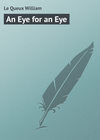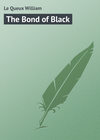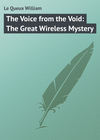Loe raamatut: «An Eye for an Eye», lehekülg 13
My reference to that fatal night when I had discovered her apparently dead in that weird house in Kensington had utterly unnerved her. I had apparently, by those words, given her proof of the strong suspicion which she had entertained, and now she held aloof from me as from an enemy. Again and again Boyd’s forcible words recurred to me. Try how I would I could not place from me the increasing belief that she had actually given me that fatal draught on the last occasion when we met.
Yet, after all, she had my welfare at heart to some extent, or she would not utter this strange inexplicable warning; she would not have so pointedly told me that the family whose guests she was were my actual enemies. The latest passion of my love had long ago kindled into a quenchless flame, and again, after this declaration of fear which she had uttered, I repeated my inquiry as to its cause.
But she shook her head, and remained silent to all my entreaty, even though her panting breast plainly showed her agitation. Had she, I wondered, really perpetrated a deed of horror? Was she, although so pure-looking and so beautiful, one of those women with inexorable determination of purpose, an actual impersonation of the evil powers?
At her invitation we strolled together across the lawn to a shady spot at the river’s brink, where we sat in long wicker chairs, tea being brought to us by the smart man-servant. Again and again I sought to discover some truth from her, but she was ever wary not to betray either herself or those under whose roof she was now living. As I lounged there by her, gazing upon her neat-girdled figure, so graceful and striking in every form, I could not help reflecting that, in a mind not utterly depraved and hardened by the habit of crime, conscience must awake at some time or other, and bring with it a remorse closed by despair, and despair by death.
Had her conscience been awakened that afternoon? To me it seemed very much as though it had.
“How strangely you talk, Eva,” I said, when we had been conversing together a long time beneath the trees, and the sun was already sinking. “You seem somehow to entertain an extraordinary antipathy towards me.”
“Antipathy!” she echoed. “Oh, no, you are really mistaken. You ask me to love you, and I express myself unfortunately unable.”
“But why unable?”
She sighed, but was silent. Her eyes were fixed far away down the tranquil river which ran with liquid gold in the sunset.
From my lips there poured swift, eager, breathless, unconsidered words in all their unreason, all their wisdom, their nobility, their ignorance, their folly, their sublimity. Yet I meant to their very uttermost every syllable I uttered.
“Tell me now,” I urged. “You wish me to leave you without a single word of hope. You give me a negative reply without reason or explanation.”
“I have a reason,” she answered in a low, mechanical tone, a voice quite unusual to her.
“What is it?”
“I am a stern fatalist in principle and in action,” she responded.
“And is it that which prevents you from reciprocating my affection?”
“No,” she answered, shaking her head sadly, and glancing at her rings. “I know that happiness can never more come to me. To love would only be to increase my burden of remorse.”
“Remorse?” I cried, in a moment recollecting all the mysterious past.
“Yes,” she answered in a hard tone of melancholy and despair. “A remorse that arises from the pang of a wounded conscience, the recoil of the violated feelings of my nature, a horror of the ghastly past, a torture of self-condemnation strong as my soul, deep as my guilt, fatal as my resolve, and terrible as my crime.”
“Your crime!” I gasped.
She had at last confessed. I sat gazing at her absolutely dumbfounded. My brain seemed dead in me.
“Yes, my crime,” she responded, her face white and hard set, her clenched hands perceptibly trembling. “Now at least you are aware of the reason that I will not accept your love. I, the woman whom you love, am unworthy, degraded and perverted, a woman who would have suffered a thousand deaths of torture rather than have betrayed myself, but who is now without pity or fear, unconscious, helpless, despair-stricken, although still linked with my sex and with humanity. Death alone would be welcome to me as bridegroom.” Then panting, she added, rising to leave me: “No, Frank, this must all end to-day. I can never love you. It is utterly impossible. You cannot know – you will never know – how I suffer.”
She had gone from me. She was to me a thing terrible, and almost loathsome. Yet she was dear to me. I was ready to give my life to ransom hers.
She stretched out her hand and musingly touched mine. I shrank as if the contact burned me. She saw my involuntary gesture of aversion. It set her heart harder on the thing she meant to do.
Chapter Twenty
A Night Adventure
In the silent evening hour, as the dusk darkened and twilight slowly faded into night, I was conscious of a kind of fascination against which my moral sense rebelled, but from which there was no escape. We talked on, I striving ever to learn the truth, she careful to conceal it from me. I saw how unexpected but natural were her transitions of temper and feeling, noted the contest of various passions, the wild hurricane of resentment melting into tears, faintness and languishment, and endeavoured time after time, but always in vain, to obtain a further confession from her lips.
That she existed in deadly fear of some dread secret being revealed was vividly apparent, just as it was also clear that my ill-timed observation regarding her mysterious presence in that house of mystery at Kensington had placed her upon her guard, and proved to her a fact of which before she had no confirmation. Her airy caprice and provoking petulance, which had so attracted me when we had been first introduced, had been now succeeded by a mixture of tenderness with artifice, and fear with submissive blandishment. She quailed before me when I rebuked her tenderly for her lack of confidence in me, partly because of her female subtlety, partly owing to natural feeling.
Nevertheless, when I reviewed the situation, and calmly and deliberately reflected upon her attitude, I saw plainly that she regarded me as something more than a mere acquaintance, even though her character was so complicated that no one sentiment could exist pure and unvarying in such a mind.
Therefore, sadly, with a heavy feeling of non-achievement, I took a long and lingering leave of her, and was driven back to Shepperton Station by Simpson, my mind overflowing with puzzling thoughts. Great as was my hesitation to believe that her conscience was a guilty one, nevertheless her own words were now sufficient proof that my suspicions were not unfounded. Yet I loved her. I still adored her with all my soul, even though I had kissed the slim white hand that had sought to send me to the grave.
These and a thousand similar thoughts whirled through my bewildered brain as I sat back alone in the ill-lit railway carriage. Puzzled and baffled, I sat plunged in deepest melancholy and despair, when, on the train drawing up at the quiet, lethargic station of Hampton, the door of the compartment was suddenly flung open, and a well-known cheery voice cried —
“Hullo, Urwin! Get out here. I want to speak to you.”
I roused myself instantly, recognising Boyd standing on the platform in the semi-darkness. With an expression of surprise at such a meeting I jumped out and joined him, he explaining that he had come down from Waterloo with the object of finding me, and had waited at Shepperton Station for my arrival there. He, however, had not spoken to me, lest the man Simpson should chance to mention the fact at Riverdene.
“But why are you down here?” I inquired surprised.
“Well,” he answered in a low voice, “we’ve got a piece of most secret investigation before us to-night. I’ve waited for your assistance. We are going to search The Hollies.”
“Search the Hollies?” I echoed.
“Yes,” he answered. “You’ll remember Miss Glaslyn’s letter to you, stating that the house was closed and the servants are away on holiday. Therefore, now’s our time. We must, however, act so that Lady Glaslyn and her daughter have no suspicion that the place has been overhauled. I obtained a search-warrant from Sir John Gibbons, the chief of the local bench, this morning, and now we’ll just satisfy our curiosity.”
“But the place is locked up, isn’t it?” I suggested, amazed at this sudden resolve.
“Of course. We must get in how we can, only being careful not to attract the attention of any neighbours, and to leave no trace behind that intruders have entered.”
“Then we are to go to work like burglars?” I observed, smiling.
“Exactly,” he answered.
We had now left the station, and were walking along an ill-lit path which skirted the railway until we gained the high road leading into Old Hampton. He explained the precautions he had taken, namely, to tell the constable on the beat of our intentions, and imposing upon him secrecy, and also to arrange for the local plain-clothes officer to be on duty in the vicinity. His proposal seemed to possess all the elements of adventure, therefore, notwithstanding my hesitation to commit any act which might further implicate the woman I loved, I expressed myself eager and ready to accompany him.
Nine o’clock chimed from the square old tower of Hampton Church, that landmark so well-known to those who frequent the river, and Boyd declared that it was too early to commence operations. People were about, and we might be observed. Therefore we entered that old-fashioned inn where the ancient sign is still suspended from a beam across the road, a hostelry much patronised by boating-parties, who there replenish their hampers, and entering the billiard-room we whiled away the time, playing and gossiping with a couple of tradesmen, who, judging from their pronouncements, were local notabilities, perhaps District Councillors.
We remained until the landlord called “Time, gentlemen, please!” then lighting our cigars went forth, strolling through the quaint old-world village, and skirting the long, high wall of Bushey Park towards Lady Glaslyn’s. The night was dark and overcast, a gusty wind had sprung up precursory of rain, and in our ears sounded the hum of the telegraph wires. The weather favoured us. For such an excursion Boyd did not care for a perfectly still night.
At length, when we had been walking perhaps a quarter of an hour along the dark, deserted road, a man, bearded and rather shabby-looking, suddenly emerged from the shadow of the wall and greeted Boyd with the policeman’s password —
“All right, sir.”
“Are the things there?” Boyd inquired.
“Yes, sir. I’ve put the lamp, the jemmy and the keys under a laurel bush on the left of the back door.”
“Well,” said my friend, “I think you’d better come with us. We may have some difficulty in getting in.”
“Very well, sir,” the man answered, and continued to walk by our side. He was smoking a pipe, and as we neared the house he knocked out the ashes and placed it in his pocket.
“No dogs there, I hope?” Boyd said, addressing him.
“No, sir. None.”
I confess to feeling a thrill of excitement, for the business of “breaking and entering a dwelling-house” was entirely new to me. The Hampton Road is ill-lit, and after ten at night utterly deserted, therefore in our walk we met no one except the solitary policeman, who stood beneath a lamp and greeted Boyd with a low “All right, sir,” as we passed on towards The Hollies.
All was in darkness. Not a soul was about save ourselves and the policeman standing watchful and motionless beneath the street-lamp fifty yards away. The well-kept garden with its laurels, its monkey-trees and its old yews was shut off from the road by a high wall, in which was a pair of heavy iron gates giving entrance to the gravelled drive. These gates were locked and secured by a chain and formidable padlock, a fact which showed that to enter we must climb them. The houses on either side were of rather meaner order than The Hollies, and in one of them a light still showed in an upper window.
In order not to attract the occupiers of these houses we conversed in low whispers, and in obedience to the local detective’s suggestion climbed the gates one after another and carefully descended within the garden. On either side of the house extended walls some ten feet in height, with doors in them giving access to the rear of the premises, and again, guided by the plain-clothes man, we scaled this wall, a somewhat perilous process, it being spiked on the top. As it was, indeed, I made a serious rent in an almost new pair of trousers, much to Boyd’s amusement.
At last, when we were in the rear garden, our guide began foraging beneath a laurel bush and brought forth a dark lantern, a short, serviceable-looking jemmy, and a big bunch of skeleton keys.
“I examined the place this afternoon,” he explained. “This door is the only one locked from the outside, therefore if we can pick the lock we shall be able to enter and get away without leaving a trace.”
“Very well,” Boyd said impatiently. “Let’s get to work,” and taking the keys he went to the garden entrance and commenced work upon the lock, while his assistant lit and held the lantern.
Every effort, however, to open the lock proved a failure.
“It’s a Chubb, a Bramah, or one of those lever locks,” said Boyd, in a low tone, giving it up after he had tried all the keys in vain. “It won’t do to force the door, for that’ll betray us.”
“Why not try a window?” I suggested.
“No, sir,” said the plain-clothes man. “They’re all barred, I’m afraid.”
“But those on the first floor,” I suggested, looking up at one, evidently a landing window, over the door.
“We might try if we could only reach it,” Boyd said, laying down the keys upon the doorstep. “If we forced the catch we could screw it down again before we left.”
In order to discover something by which we might gain access to the window we all three crept carefully across the lawn and down the long old-fashioned garden to an outhouse, where, after some search, we found an old and rotten ladder, half the rungs of which seemed missing. This we carried back, and a few moments later Boyd, mounting, with a strong clasp-knife which he had taken from his pocket, began slowly working back the catch, until at last he was able to throw up the window and crawl in. Without a sound I followed, the local detective clambering in after me.
We found ourselves on the first floor landing, therefore, descending the stairs to the main hall, we lit the candles provided by the plain-clothes man, and after taking the precaution to let down the blinds of the front windows, commenced an active search of the drawing-room, that spacious old-fashioned apartment into which I had been shown when I had called. Our search, directed by Boyd, was careful and methodical; neither nook nor corner escaped him, although we replaced everything just as we found it. So large were the rooms that we found the lights we carried were not sufficient to give us proper illumination, therefore we sought the gas-meter, and after turning on the gas, lit jets in the various rooms. Fortunately all the windows were furnished with Venetian blinds, therefore we let them down and closed them, so that no light should be noticed outside.
An air of desolation hung about the place, and every sound we made echoed weirdly, for at dead of night all noise becomes exaggerated. The drawing-room yielded practically nothing, therefore we passed into a well-furnished morning-room, and thence to the dining-room, which we likewise thoroughly overhauled. None of these rooms bore any trace of the struggle with poverty which the innkeeper’s wife had alleged. Indeed, in the drawing-room was a fine grand piano of one of the best-known makers, together with several rare works of art. All the rooms bore signs of being the abode of a rich and cultured family, the old oak in the dining-room being, I noted, genuine, evidently antique, Italian, while the upholstery and carpets were of the first quality. On the walls of those ground-floor rooms were many examples of old as well as modern masters, one portrait hanging in the dining-room representing Eva herself, a half-length picture, undoubtedly from recent sittings, signed by an artist extremely well-known in London. In this room also were antique high-backed oak chairs, lined with old tapestry, the back and arms bearing armorial bearings embroidered in coloured silks, evidently the arms of the Glaslyns, for a similar device was upon the plate.
On ascending to the first floor we found the house to be of far larger proportions than we had imagined, for off a long, well-carpeted corridor opened quite a number of bed and other rooms, each of which we proceeded to inspect.
“We haven’t found a single thing below,” Boyd observed to me, as we entered the first of these rooms, evidently one of the spare bedrooms, for the place was very dirty and neglected in comparison with the other apartments. “Let’s hope we may come across something here.”
Nothing was locked, and five minutes sufficed to show us that no attempt had been made to conceal anything in any of the two chests of drawers, or in the wardrobe. So thoroughly did Boyd search that in each room he went around the wainscoting, tapping it with the jemmy and examining any part which appeared to be loose or movable. The next room, apparently Lady Glaslyn’s room, with a small dressing-room adjoining, we searched with redoubled energy, but beyond establishing the fact that her ladyship was not in want of money by the finding of three five-pound notes placed carelessly in an unlocked drawer, there was nothing to arouse our curiosity.
Adjoining the dressing-room, with its window overlooking the road, was a small but elegant apartment upholstered in pale-blue, quite a luxurious little room with a piano; evidently a boudoir. The carpet was so thick and rich that our feet fell noiselessly, while near the window was a handsome Louis XV escritoire inlaid with various woods and heavy mountings of chased ormolu. A pretty cosy-corner occupied the angle beside the tiled hearth, while the little bamboo table with its small shelves spoke mutely of cosy five-o’clock tea often served there.
“I wonder what’s in this?” Boyd said, advancing to the escritoire while his assistant lit the gas.
Finding it locked, my friend bent, examined the keyhole carefully, and then commenced to ply the various skeleton keys. For some time he was unsuccessful, but at length the lock yielded and he opened it. Then, while the local officer took the dark lantern and went along the corridor to explore what further rooms there were, and their character, Boyd and I proceeded to carefully examine every paper, letter or document the escritoire contained. Some letters were addressed to Lady Glaslyn, others to Eva, but most of them were ordinary correspondence between relatives and friends, while the folded documents were receipted bills, together with a file of papers relating to some action at law regarding property near Aberdeen.
Behind the receptacle in which we found these letters was a panel which Boyd at once declared concealed some secret drawers, and being well versed in all the contrivances of cabinet-making, be very soon discovered the means by which the panel could be released. As he had predicted, its removal disclosed three small drawers.
To the first I gave my attention, while he took out the contents of the second. The letters, of which there were seven or eight, secured by an elastic band, I took out and read, being puzzled greatly thereby. They were all type-written and bore the post-mark “London, S.E.” The first had been received about three months before, the last as recently as a fortnight ago. They were very friendly, commencing “Dear Eva,” and although the writer was apparently extremely intimate, there was, however, not a word of love, a fact which gave me some satisfaction. They all, without exception, contained a most mysterious reference to “the Silence,” in terms extremely guarded and curious, one urging the utmost caution and declaring that a grave peril had unexpectedly arisen which must, at all hazards, be removed. The writer did not appear to be a very educated person, for in many places there were mistakes in spelling, while all were devoid of both address or signature, bearing only the single initial “Z.”
I passed them over to Boyd, asking his opinion, and as he sat at the writing flap reading them we were both suddenly startled by hearing a plaintive cry near us. It was a poor lean cat, who had accidentally been shut up there and was undoubtedly starving.
“These letters are very strange,” Boyd observed, looking up at me. “I wonder to what the silence refers?”
“I don’t know,” I said. “There’s evidently some very good reason that they’ve been concealed here.”
As I was speaking I took from beneath some letters, still remaining in the secret drawer Boyd had opened, a wooden pill-box, from which I removed the lid, there being disclosed a small quantity of a peculiar greyish-blue powder.
“Hulloa!” Boyd exclaimed, with a quick glance at it. “What’s that, I wonder? No label on the box. It looks suspicious!”
“Yes,” I agreed. “I wonder what it is, that it should be so carefully concealed?”
“Leave it aside for a moment,” he said.
Then taking up a large envelope which, while I had been reading the letters, he had been carefully examining, he drew from it two photographs.
“Do you recognise the originals of these?” he inquired with a grave smile.
“Great Heavens!” I gasped. “Why, they are the man and the woman whom we found at Phillimore Place!”
“Exactly,” he said, in a voice of satisfaction, just as his assistant re-entered.
Then, before I could recover from my bewilderment, he took up the little wooden box, exclaiming —
“This powder here is a very suspicious circumstance, but we’ll test it at once.”
Turning to the local officer he said —
“I saw you eating something when you met us and you put part of it in your pocket. What was it?”
“A sandwich. My wife always makes me one when I go out on night-duty,” the man explained.
“Have you any of it left?”
For answer he drew from his pocket a portion of an uneaten sandwich and placed it upon the table. Boyd, with his pocket-knife, cut off a piece of the meat, upon it sprinkled a grain or so of the mysterious powder, and threw it down to the hungry cat, which was mewing loudly, and purring round our legs.
The thin creature, ravenously hungry, devoured it, but ere ten seconds had passed, and while we all three were watching attentively, it staggered, with a faint cry, and almost without a struggle rolled over, dead.
“As I suspected,” Boyd observed, turning to me. “This is the powder from the herbalist’s.”




















